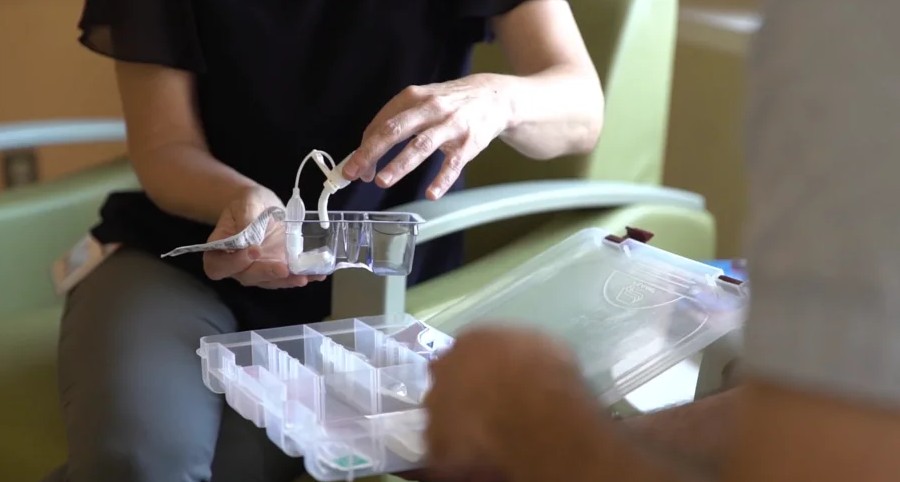
Family member creates portable tracheotomy kit
It was a healthy pregnancy with no signs of trouble.
Then, a premature birth followed by a visit to McMaster Children’s Hospital (MCH) where a Paris, Ontario, family learned their daughter, Mara, had an absent pulmonary valve. This is a rare anomaly of the heart where blood does not flow efficiently, causing low amounts of oxygen.
It was a shocking experience for Mara’s father, Christian, in what should be one of the most joyful periods in a parent’s lifetime.
The experience, though, ultimately led to an important and innovative opportunity for hospital staff to use themselves and improve patient safety.
“I remember being in the room and first hearing her diagnosis,” says Christian. “My jaw hit the floor when I first saw diagrams comparing her heart to a healthy one. I didn’t know if I was going to make it.”
After their daughter underwent cardiac surgery, the family spent more time at MCH where they later discovered the child needed a tracheotomy—a surgical procedure that makes an incision in a person’s neck to clear the airway.
Shortly after Mara got the tracheotomy, she was ready to be discharged.
When a family is ready to leave the hospital, they visit with hospital staff to review some routine procedures to care for the patient at home.
Christian needed to learn how to manage Mara’s tracheotomy, including how to troubleshoot any problems with the ventilator. If it ever became inoperative, he needed to figure out how to fix it in the moment.
During the training he and his family received, the team went through a few hypothetical scenarios.
Christian pointed out one scenario where he would need instant access to all the tools to perform a safe operation. It was at this moment he came up with the idea to create an emergency “tackle box” kit that is easily retrievable.
“I started thinking, rather than spending time looking for different tools I need, I should have some sort of kit that’s ready to go with everything I need inside it,” says Christian. “Nothing would make my anxiety increase more than having to look for all this equipment while Mara is suffering.”
The process-driven father of two took his creation to Cindy Brennan, a respiratory care coordinator at MCH, who embraced it immediately.
“Christian’s kit changed the way we set up our rooms for tracheotomy patients,” says Cindy. “Families are the experts in their child’s care. It’s important to hear their perspectives and allow them to bring new ideas to us.”
The result delivered an improvement opportunity as part of the Continuous Quality Improvement (CQI) initiative, a new management system at HHS that enables staff to solve problems at the unit level. Many improvements aim to improve the patient experience or offer savings of time and resources.
It also showed how patients and families are involved in improving the way we provide care.
Christian agrees.
“There’s always been a commitment from staff to hear everyone out to make things better.”
